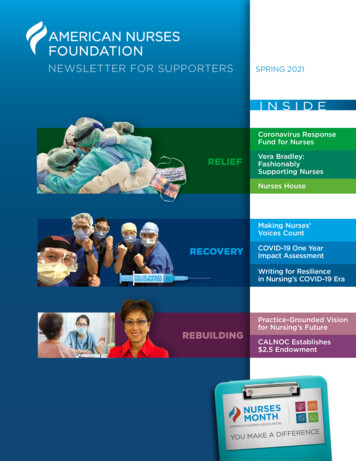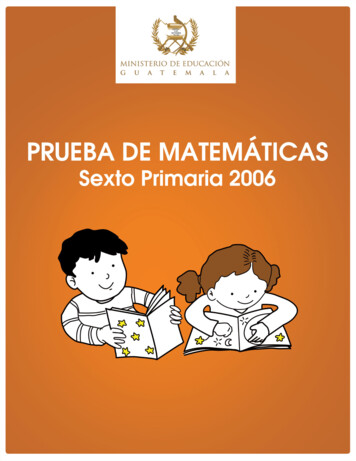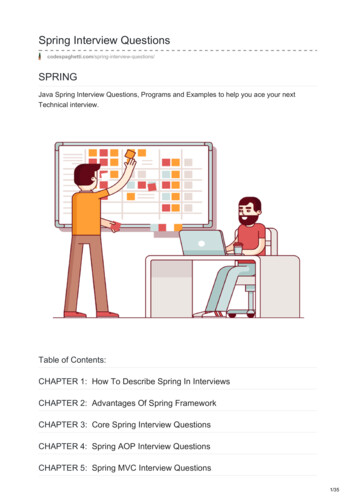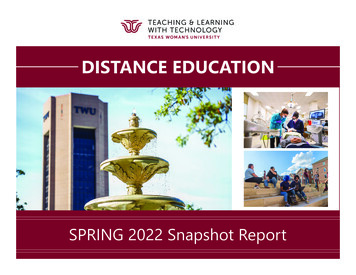
Transcription
NEWSLETTER FOR SUPPORTERSSPRING 2021INSIDECoronavirus ResponseFund for NursesRELIEFVera Bradley:FashionablySupporting NursesNurses HouseMaking Nurses’Voices CountRECOVERYCOVID-19 One YearImpact AssessmentWriting for Resiliencein Nursing’s COVID-19 Era70% OF NURSESVACCINATEDREBUILDINGPractice-Grounded Visionfor Nursing’s FutureCALNOC Establishes 2.5 Endowment
RELIEFProviding immediate assistance for nurses impacted by the pandemicCoronavirus Response Fund:Helping NursesSince the Fund was established in April 2020, generous donations from individuals, corporations andfoundations helped launch many initiatives including:Mental Well-BeingAdvocacyTo date, over 25,300 nurses have participated in theWell-Being Initiative program offerings, this includes: Moodfit6,000 active users on this app thatsupports nurses’ overall mental wellness. Happy AppOver 1,000 nurses used this free,24/7 support line for one-on-one conversations. Narrative Expressive Writing ProgramNearly 800nurses participated in the program’s first phase. Stress Self-Assessment ToolOver 3,300 nursesused this 10-question scale to evaluate their stresslevels and get recommendations for resources. “A Nursing State of Mind”Podcast series wasdownloaded by over 11,500 nurses.Financial Assistance Distributed in partnership with Nurses House,financial aid grants totaling 2.35 million to over2,000 nurses across 45 states. Granted an additional 250,000 to NursesHouse at the end of 2020, with specificdirectives to allocate:- 100,000 specifically for nurses of color- 75,000 for nurses working in long-term care,hospice, and home care- The remaining 75,000 is for RNs withno restriction Launched the Pulse on the Nation’s Nurses SurveySeries focused on core issues of mental health,financial impact, PPE, innovation, and vaccinedevelopment. Results generated interest from themedia, Capitol Hill, the CDC, the FDA, and FEMA. Funded a major grant to the TriCouncil forNursing - American Nurses Association, AmericanOrganization of Nurse Leaders, National Councilof State Boards of Nursing, National League forNursing and American Association of Colleges ofNurses - to generate an advocacy blueprint forpost-COVID nursing issues. Provided two grants to Planetree Internationalto convene a coalition of nursing leaders, patient/family and elder advocates for the creation of aprototype of the Family Presence Policy DecisionMaking Toolkit. This resource is for nursing executivesto use when supporting safe family presence inhealthcare settings during major health crises.Education and Evidence-BasedInformation Supported the creation of a COVID-19 webinar seriesproduced by ANA. The series attracts thousands ofnurses each week, with the total number of viewsnow over 220,000. Topics include PPE, ventilators,racial disparities, and mental health. Sponsored ANA’s participation in a national AdCouncil vaccine education campaign, which alsofeatured the AMA and AHA.I stay positive at work with my patients and team by taking time to relax and reduce stressby walking along the beach every chance I get. Our team of nurses are resilient and provideoutstanding care, but we can only provide great care if we take time to care for ourselves. Ourmental and physical health must not be overlooked during the all-encompassing response to theCOVID-19 pandemic. We can only continue this pace by supporting one another and encouragingone another to take the time we desperately need to recharge.Chante’ L.,2MSN, RN, CNOR
RELIEFVera Bradley:Fashionably Supporting NursesAt the start of the pandemic, Vera Bradley, the iconicwomen’s fashion and lifestyle brand, committed tosupporting the nation’s healthcare workers, especiallynurses. In addition to distributing over five millionmedical-grade face masks to frontline workers, thecompany also manufactured branded, cotton facemasks for the public to purchase.“Throughout the COVID-19 crisis, we found comfort andguidance in what has always mattered most: each other,”said Rob Wallstrom, Chief Executive Officer of VeraBradley. “We are inspired every day by the nurses andfirst responders who have so bravely been taking care ofus, and we are honored to support the American NursesFoundation and the incredible work they’re doing to helpthe nation’s largest body of healthcare professionals.”Early last spring, Vera Bradley executives announced itwould donate a percentage of sales from these cottonface masks. From April through July 2020 this campaignraised a remarkable 633,636 for the Foundation’sCoronavirus Response Fund for Nurses. Vera Bradleywas so pleased with the results – and all the Foundationaccomplished with the funds – that they extended thecampaign through June 2021.“We are incredibly grateful to Vera Bradley for theirgenerous support, as well as their recognition andappreciation of the vital role nurses have in caring for andhealing communities, especially during the pandemic,”said Willie Manzano, MA, RN, NEA-BC, FAAN, President,American Nurses Foundation. “We have so muchimportant work underway, and this donation is helping usmake significant impact on the critical areas where nursesneed immediate and ongoing support.”You can view a video of Rob Wallstrom presenting thisdonation to Foundation Executive Director Kate Judge here.Nurses HouseIn July of 2020, the Foundation’s national survey of10,000 nurses found more than half of the respondentswere worse off financially than they were pre-pandemic.While many nurses faced work challenges like PPEshortages and staffing along with the mental stress ofcaring for COVID-19 patients, others faced furloughs,lost wages due to contracting COVID, or unpaid timeoff to care for a family member.To alleviate this financial strain on nurses, the Foundation,through direct donations to the Coronavirus ResponseFund for Nurses, granted 2.6 million to Nurses House.The grant provided direct financial aid to U.S. registerednurses impacted by the COVID-19 pandemic. To date,Nurses House distributed 2.35 million, which assistedover 2,000 individual nurses across 45 states. Thisfunding amounts to nearly 90% of the total amount thatNurses House has provided to nurses over the past year.As one nurse said in response to the financial aid, “Thankyou SO much for the generous grant from the COVID-19emergency fund. The support helped me stay afloat afterbeing out of work with severe COVID. Thank you and theAmerican Nurses Foundation for making this assistancepossible for other nurses as well as myself.”Every day, nurses are pushing themselves to the limit soour communities and loved ones stay safe and healthy.All of us here at the American Nurses Foundation arehonored we can care for nurses in return.terk for a month afI was out of worsVID. The Nurseexposure to COtly helped me geHouse grant realusehold things.caught up on hoRamona W.3
RECOVERYListening to nurses and increasing their strength and resilienceMaking Nurses’ Voices CountLast year the Foundation committed to addressing theimpact of COVID-19 on nurses and the nursing workforce.Recognizing action first requires deeper understanding, theFoundation launched the Pulse on the Nation’s Nurses:COVID-19 Survey Series. Since May 2020, the Foundationconducted eight surveys focusing on mental health,financial impact, PPE, innovation, and vaccine development.Over 100,000 nurses from all 50 states andthe District of Columbia shared insightson their practical concerns, mental healthand wellness, and financial challenges.The results reveal the myriad of hardships nurses facebeyond daily work challenges. In the most recent MentalHealth and Wellness survey, more than half of nursesdisclosed feeling anxious and overwhelmed. One surveyparticipant described the stark reality she and other nursesface: “All of my ICU colleagues are completely burned out.We see such a large number of COVID deaths in our unitit’s very taxing to our mental health.”This concern for mental health was echoed by anothernurse who said, “As a COVID ICU nurse, I worry aboutmy mental health. I hope there is a real focus on assistingthose of us who work the frontlines. I would love tosee articles to help us process all this loss, sadness,and uncertainty.”The latest survey, COVID-19 One Year Impact Assessment,disclosed new vulnerabilities among nurses from deferredretirement investments, lost savings, and the end ofstudent loan forbearance. For many frontline nurses,reductions in salary and additional expenses like childcareare significantly affecting their financial security.“After receiving a nursing grant, I am doing betterfinancially. However, I dread when school beginsbecause I can’t afford to have my children lookedafter while I’m at work.”“At the Foundation, we’ve been supporting and listeningto our frontline caregivers since long before the pandemic.While we navigate the phases of our COVID-19 relief,recovery, and rebuilding, it’s critical to recognize we alsoneed to address the phases of nurses’ personal experiencesand needs,” said Willie Manzano, MA, RN, NEA-BC, FAAN,President, American Nurses Foundation. “These surveysgive nurses a voice to share their experiences and helpinform the Foundation’s programmatic and grant strategies.”As the needs of nurses evolve, the Foundation willcontinue conducting these pertinent surveys through2022 to mobilize the voices of nurses around criticalissues impacting them during this unprecedentedhealth crisis and beyond.We have been through a tough year that taught us about ourselves as individuals, teammembers, and nurses. We learned a lot, notably, just how strong we are especially when we bandtogether. There have been some very difficult days we experienced with our patients and I watchedus grow from fearing the unknown at the beginning of the pandemic to now being more hopeful andknowledgeable. This experience has made me a more self-aware nurse, not just when caring forothers, but also myself. I’m making sure to advocate that all staff take time for self-care.We can’t care for others if we don’t care for ourselves.4Lori S.,MSN, RN, CNRN
RECOVERYCOVID-19One Year Impact AssessmentTo mark one year since the World Health Organization declared COVID-19 a global pandemic,the Foundation released the results of its latest survey, the COVID-19 Impact Assessment.Following are highlights of the results from the survey of 22,000 nurses nationwide:MENTAL HEALTHNURSES 34 YEARS AND YOUNGER FEEL:81% EXHAUSTED71% OVERWHELMED65% ANXIOUSThe pandemic continues to take a tollon nurses’ mental health, particularlythose early in their career.FINANCIAL IMPACTConcerns about finances are still a factor.FAMILY FINANCES AND CONCERNS OUTSIDE WORK:41% FINANCE/DEBT A TOP CONCERN19% FINANCIALLY WORSE-OFF NOWSTATE OF THEPROFESSIONWhile 85% of nurses say theydon’t intend to leave theprofession, 40% say theyare considering or plan toleave their position in thenext 6 months.VACCINESA majority (70%) of nurseshave received the vaccines.WHY ARE NURSES LEAVING THEIR POSITIONS?47% WORK AFFECTING HEALTH45% INSUFFICIENT STAFFINGBARRIERS STILL EXIST:BLACK/AFRICAN AMERICANS46% NOTVACCINATEDUNDECIDED ABOUT25% RECEIVINGTHE VACCINE5
RECOVERYWriting for Resiliencein Nursing’s COVID-19 EraHow to cope with the emotional toll of COVID-19 era nursing?That question spurred the Foundation to fund a NarrativeExpressive Writing program designed to help nursesdevelop emotional resilience.“Nurses have experienced a lotof fear, stress, and grief with somany patients dying. Nurses areoften the ones holding the iPadup so families can say goodbye.It’s traumatic,” said MeredithMealer, RN, PhD, PMHNP, AssociateProfessor, School of Medicine at theUniversity of Colorado’s AnschutzMedical Campus, who has researchedways to address psychologicaldistress among healthcare workersfor 15 years.Streamlined for time-stressed nurses, the programfeatures five weekly writing prompts about nurses’pandemic experiences. Nurses send anonymoussubmissions to a database. They receive written responsesfrom licensed mental health providers whose followup questions and insights are designed to help nursesdevelop the research-validated coping skill of moreflexible thinking about traumatic events. A second phasebegan in April 2021 and will serve up to 4,000 nurses.Responsive support from mental health providers is aunique feature of the program, which applies recentresearch on the ability to develop resilience – the abilityto see a situation from more than one viewpoint.“We are providing nurses with supports to cultivatecognitive flexibility and reframe thinking about traumaticexperiences,” said Mealer. “This is important becausenurses with higher resiliency are significantly lesslikely to have symptoms of burnout, PTSD, depression,and anxiety.”Writing helps the participants process traumatic orstressful experiences described by nurses like theirfear of getting the coronavirus and transmitting it toloved ones, seeing both young and old die, witnessingchronic health conditions from the virus, and stressfrom overwhelming numbers in hospitals. “It’s likeall I see in my head is this loop of death,” wroteone nurse, describing days when multiple patientscoded simultaneously.“Many nurses are in self-preservation mode as theygo to work,” Mealer noted. “As weemerge from the pandemic, we willcontinue to see nurses who werenegatively impacted but just werenot ready to address or process theirexperiences until after the pandemicwas over. From my ongoing research,I know there will always be a need tobuild resilience and promote mentalwellness in our bedside nurses.”Mealer adds, “What really matters is that if youimprove nurses’ resilience and wellness, they’regoing to get better.”I am fatigued and have been stretched thin over the past year. I have seen myself and othersat their best and at their worst. Still, it has been my privilege to walk alongside my patients throughthis pandemic. To be a steady, calm, and confident resource of reliable, evidence-based information.I am continuing to shift my focus and energy towards helping the poor and marginalized. I will betraveling to Tijuana to work with displaced and vulnerable populations in collaboration with existinghealthcare organizations along the US-Mexico border.6Emma C., APRN
REBUILDING Evolving the practice of nursing to transform healthcarePractice-Grounded Visionfor Nursing’s FutureWilhelmina (Willie) Manzano, MA, RN, NEA-BC, FAAN beganleading the American Nurses Foundation board a year agojust as COVID-19 began to disrupt life and nursing practice.“We know the pandemic has taken a toll, and theFoundation offers resources to support your mentalhealth, well-being, and help build resilience,”says Manzano.Manzano brings a practice-grounded clarity of vision towhat’s necessary for nurses at this moment, and as theFoundation works to transform the nursing profession tomeet the nation’s most urgent healthcare needs.Manzano was recently named Chief Operating Officer forall Perioperative Services at NewYork-Presbyterian HealthSystem Enterprise, a 10-site healthcare system, whilemaintaining her role as Chief Nursing Executive. She helpedthe organization respond to the tsunami of COVID-19patients in her prior roles as CNE and Chief Quality Officer.“I am so proud of how my nurse colleagues in New Yorkand nationally answered the endless calls for assistance,innovation, teamwork, compassion, and sharing of theirexpertise,” says Manzano, who also serves as AssistantDean at Columbia University School of Nursing and is aFellow of the American Academy of Nursing.Manzano is especially interested in increasing leadershipopportunities for nurses and in developing and supportinga more diverse nursing workforce. “We are committedto assuring the voices of nurses drive the organization’spriorities, programs, tools, resources, and advocacy. Myhope is that COVID-19 will be a catalyst for our urgent workto reimagine nursing so we can improve access and healthoutcomes for all Americans. I can think of no better group toadvance health equity; and I am forever grateful for all ournurses and frontline caregivers continue to do to keep all ofus healthy and safe.”CALNOC Establishes 2.5 Million EndowmentThe Collaborative Alliance for Nursing Outcomes(CALNOC), the nation’s first database of nurse sensitivemeasures and a pioneer in health services research,recently endowed a 2.5 million gift to theFoundation for theestablishment of theCALNOC ResearchFund. This is the largestendowment gift in theFoundation’s history.The newly created Fund will foster innovative researchand scientific inquiry on the contributions of nursingpractice in ambulatory care to patient care, safety, andquality. The Foundation, with counsel from the AmericanNurses Credentialing Center (ANCC) and the leadership ofRebecca Graystone, Vice President, Magnet and Pathwayprograms, will provide grants from the Fund.This endowment is a testament to the past efforts ofCALNOC researchers and nurse scientists, as well as thecontributions of nurses, nursing leaders and executiveswho championed quality and safety measurements toimprove patient care.“This Fund ensures the legacy of CALNOC will continueand flourish through the American Nurses Foundation,”said Mary Foley, Chairperson of CALNOC. “We are gratefulfor the Foundation and ANCC for their support andstewardship of this endeavor.”I am doing well, and I’m glad I was able to get the vaccine. At the beginning of the pandemic,I felt scared, anxious, afraid of catching the virus and giving it to my family and friends. Fast forwarda year, I have more knowledge and feel less anxious about the virus. Especially as more people getthe vaccine. The pandemic made me a more adaptive nurse able to work in different roles. Frombeing a charge nurse in my unit, to cross training in the COVID ICU and floating all around thehospital. It also made me resilient and more patient.Dionne R., BSN, RN, CMSRN7
Nurses MonthShop and Celebrate!Over the past year, nurses have shownthe world that in times of greatest need,they are at our side to provide expert careand a hand to hold. During Nurses Monththis May the Foundation encourages youto join in honoring nurses for their tirelesscommitment.Go here to find an array of special offersfrom generous supporters – plus celebratorydeals exclusively for nurses. When you makea purchase, participate in an event, or joina campaign, the Foundation will receivedonations from the proceeds. By takingadvantage of these offers you will help theFoundation provide nurses with mentalhealth and wellness support and continuingeducation, as well as drive national advocacyfocused on nurses and patients.BOARDOF TRUSTEESWilhelmina M. ManzanoPRESIDENTJoyce J. FitzpatrickVICE PRESIDENTTom TefftSECRETARY/TREASURERPaul W. AbramowitzKaren DaleyKathy DriscollZoila D. EscobarLaura Leigh FerrioRandall LippsKathleen MallochMehul MehtaAhrin MishanBernie ParkRuth Williams-BrinkleyThe world has neverneeded nurses more.Help support the critical work we dowith a tax-smart gift from your IRA.Did you know you will owe income tax on money in your IRA? You canavoid those taxes completely if you make a gift to the Foundation fromyour IRA either through your estate or, if you are over age 70 ½, duringyour lifetime.If you are over 70½, this contribution from your IRA can satisfy yourrequired minimum distribution without increasing your income taxes.The Qualified Charitable Distribution is a tax-reducing and tax-free wayto support the nursing profession.You have important priorities for your family and loved ones, and weknow they come first. When you are ready, we will be here to help youshape a charitable gift plan that suits your needs and allows you tokeep supporting the Foundation’s important work.For more information please visit ourwebsite at giftplanning.nursingworld.orgor call Karen Schofield-Leca at 301-628-5095.8The American NursesFoundation is a 501(c)(3)charitable organization witha vision of a healthy worldthrough the power of nursing.8515 Georgia Avenue, Suite 400Silver Spring, MD 20910-3492givetonursing@ana.org301-628-5227
Narrative Expressive Writing Program Nearly 800 nurses participated in the program's first phase. Stress Self-Assessment Tool Over 3,300 nurses used this 10-question scale to evaluate their stress levels and get recommendations for resources. "A Nursing State of Mind" Podcast series was downloaded by over 11,500 nurses.










